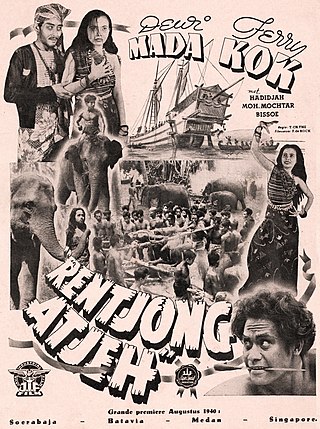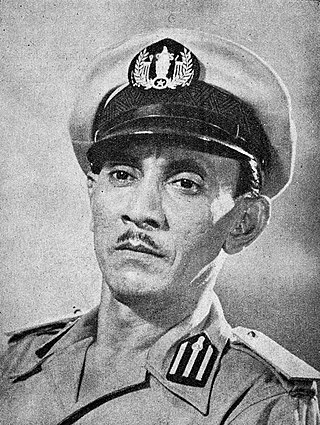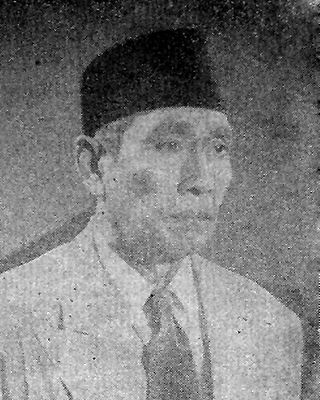Production
Gadis Desa was produced by the South Pacific Film Corp (SFPC), a film production house owned and run by the Netherlands Indies Civil Administration, a continuation of the former colonial government of the Dutch East Indies. The film was directed by the former journalist Andjar Asmara, who had worked for SPFC since 1948. The film was adapted from a stage play he had written for the travelling troupe Dardanella in the early 1930s. [6] He brought Usmar Ismail, a young journalist with whom he had previously discussed filmmaking, to the production as an assistant director. The two native men had limited creative input, serving more as acting and dialogue coaches. The Dutch cameraman, AA Denninghoff-Stelling, held more power over the final product.
Gadis Desa starred Ali Joego, Ratna Ruthinah, Basuki Zaelani, and Djauhari Effendi. All had had theatrical experience: Joego had been a member of Dardanella with Andjar, Ruthinah and her husband Zaelani –making their feature film debut – had been members of the Matahari touring troupe, while Djauhari had been active in the theatre during the Japanese occupation beginning seven years earlier.
Release and reception
Gadis Desa was released in 1949, followed by a novelisation in 1950. Although he does not record its box-office performance, the Indonesian film historian Misbach Yusa Biran suggests that the film's dated plot was reflective of a Dutch belief that native audiences would prefer unsophisticated comedy. A 35 mm copy is kept at Sinematek Indonesia.
The film proved Andjar's last as a director; he resigned from SPFC before its next production, Tjitra (1949), and spent the rest of his film career as a screenwriter. Ismail would go on to become two films for SFPC, Tjitra and Harta Karun (1949), and, after the Netherlands recognised Indonesia's independence, he established himself as the "father of Indonesian film" with Darah dan Doa (1950). SPFC would produce four further films before being dissolved in 1949.

Abisin Abbas, better known by his pseudonym Andjar Asmara, was a dramatist and filmmaker active in the cinema of the Dutch East Indies. Born in Alahan Panjang, West Sumatra, he first worked as a reporter in Batavia. He became a writer for the Padangsche Opera in Padang, where he developed a new, dialogue-centric style, which later spread throughout the region. After returning to Batavia in 1929, he spent over a year as a theatre and film critic. In 1930 he joined the Dardanella touring troupe as a writer. He went to India in an unsuccessful bid to film his stage play Dr Samsi.

Kartinah is a now-lost 1940 romance film from the Dutch East Indies that was written and directed by Andjar Asmara. The film, Andjar's directorial debut, follows a nurse and her superior as they fall in love in the Air Raid Preparation team. Produced by The Teng Chun's New Java Industrial Film, Kartinah was heavily subsidised by the country's government and through product placement. Although it was a critical failure, the new actors signed with the studio for Kartinah gave New Java Industrial Film increased production capabilities.
Melati van Agam is a 1931 romance film directed by Lie Tek Swie and produced by Tan's Film. Starring A. Rachman, Neng Titi, Oemar, and Bachtiar Effendi, the two-part film follows the young lovers Norma and Idrus. The film, which may be lost, was reportedly a commercial success, but critical reviews were less favourable.

Bachtiar Effendi was an Indonesian film actor and director who also served as a cultural critic. Beginning his film career in 1930, he made several works for Tan's Film before joining a drama troupe.

Rentjong Atjeh is a 1940 action film from the Dutch East Indies directed by The Teng Chun. Telling of a group who take revenge against pirates in the Strait of Malacca, it starred Ferry Kock, Dewi Mada, Bissoe, Mohammad Mochtar, and Hadidjah. It was filmed near the shore in Batavia and reused footage from The's earlier work Alang-Alang (1939). Rentjong Atjeh, inspired in part by the Tarzan films, was a commercial success, although it may now be lost.

Raden Ariffien, often credited as Rd Ariffien, was an Indonesian film director. Initially a nationalist figure, he entered the film industry in 1940 after a period in theatre and radio. During his 25-year career, he was involved in some 36 films in various positions. He later became head editor of the film magazine Varia.

Raden Inoe Perbatasari was an Indonesian politician turned film director and actor.

Mohammad Said Hamid Junid, often credited as Moh. Said HJ, was a film director, storywriter, and actor active in the early cinema of Indonesia. After an unsuccessful career in the theatre he directed some nineteen films, beginning with Boenga Sembodja in 1942.
Tjitra is a 1949 Indonesian film directed by Usmar Ismail for the Dutch-owned production house South Pacific. Starring Raden Sukarno, Nila Djuwita, and Raden Ismail, it follows a man named Harsono who takes a woman's virginity then flees to the city, where he is caught up in a murder case. Ismail's directorial debut, Tjitra was made while its director was still a member of the Indonesian Army. He later disavowed the film, as he felt he had had too little creative input.

Darah dan Doa is a 1950 Indonesian war film directed and produced by Usmar Ismail, telling the story of the Siliwangi Division and its leader Captain Sudarto on a march to West Java. Following Ismail's Dutch-produced Tjitra (1949), Darah dan Doa is often cited as the first 'Indonesian' film, and the film's first day of shooting – 30 March – is celebrated in Indonesia as National Film Day.

Max Tera was an Indonesian cinematographer and editor. He was employed by PERFINI in the 1950s and was a frequent collaborator with director Usmar Ismail.

Astaman was an Indonesian actor active from the 1910s until the mid-1970s. He was a leading actor in the influential theatre company Dardanella and, after entering the film industry with 1940s Kartinah, acted in 43 films.

Ratna Moetoe Manikam, also known by the title Djoela Djoeli Bintang Tiga, is a film from the Dutch East Indies.
Noesa Penida is a 1941 film from the Dutch East Indies which was directed by Andjar Asmara and produced by The Teng Chun of Java Industrial FIlm. It tells of a love triangle between two brothers, born to a commoner, and a noble woman.
Elang Darat is a 1941 film from the Dutch East Indies which was directed by Inoe Perbatasari and produced by The Teng Chun for Jacatra Film. A detective film, it follows a man who comes to a village to track the villainous bandit known only as "Elang Darat".
Djaoeh Dimata is a 1948 film from what is now Indonesia written and directed by Andjar Asmara for the South Pacific Film Corporation (SPFC). Starring Ratna Asmara and Ali Joego, it follows a woman who moves to Jakarta to find work after her husband is blinded in an accident. SPFC's first production, Djaoeh Dimata took two to three months to film and cost almost 130,000 gulden.

Ali Joego was a stage and film actor and director active in the Dutch East Indies and Indonesia. During his twenty-year career he appeared in thirty films and directed seven.

Indriati Gerald Bernardina, also known by her stage name Indriati Iskak and after marriage as Indri Makki, is an Indonesian actress turned psychologist and marketer. She entered the Indonesian film industry and soared to popularity with Usmar Ismail's commercially successful Tiga Dara (1957). She appeared in eight further films and established her own girl group before retiring from cinema in 1963. She graduated from the University of Indonesia with a degree in psychology in 1968, and has taught the subject at the Jakarta Art Institute. For twenty-six years she worked with Unilever, and since 1994 she has been a marketing consultant with Makki Makki.

The South Pacific Film Corporation (SPFC) was a Dutch government sponsored feature film producer in the Dutch West Indies. A separate unit produced newsreels in Indonesia. The production company was sponsored under the Netherlands Indies Civil Administration. It was preceded by the Netherlands Indies Government Information Service.














